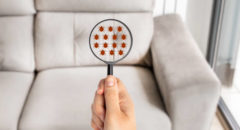
Intimate partner violence is beyond skin deep.
Yes, the bruises appear. The tears, they dry. The scars, they heal. The smile sometimes reappears with a glimmer of hope, but left are the invisible scars of abuse. Intimate partner violence (IPV) is much more than skin deep. It disguises itself in a variety of ways such that even the perpetrator does not realize its mask and the survivor thinks it’s love. But what lies beneath the surface of the skin is much more complex than meets the eye.
What is intimate partner violence?
The term “intimate partner violence” or “IPV” describes physical, sexual or psychological harm by a current or former partner or spouse. This type of violence can occur among heterosexual or same-sex couples and may or may not be sexual in nature. IPV can vary in frequency and severity. It most often occurs on a continuum, ranging from insults, to chronic, severe battering. IPV encompasses a broad range of abusive behaviors including: physical violence, sexual violence, psychological abuse, economical abuse, stalking, sex trafficking, harassment, and threats of physical or sexual violence.
Who experiences IPV?
The picture of a survivor does not have a specific face or look. Not all individuals in abusive relationships come from broken, fatherless or motherless homes, have low self-esteem, hate themselves or live in poverty. Many survivors of IPV are well educated, successful, professional women and men that come from high socio-economic backgrounds. IPV does not discriminate against class, race, ethnicity, culture, gender, political, religious or social affiliation.
SIGN UP FOR OUR NEWSLETTER HERE!
It’s about power and control!
IPV is all about power and control. The abuser uses their power to maintain control over their victim. There are a variety of ways that the abuser maintains control. Some of those ways include: gaining their trust with small acts of kindness, breaking down self-esteem, convincing them they do not deserve better, use of intimidation, threats, humiliation, economic depravity, isolation from family and friends, harassment, physical violence, sexual violence and so much more. Once the abuser has complete control over their victim, the victim is less likely to leave and/or get help and in some cases, begin to sympathize with their abuser.
What triggers it?
IPV is comprised of various dynamics that contribute to the abuse. The violence that perpetrates the abuse can stem from negative intergenerational patterns, childhood abuse, lack of self-esteem and self-efficacy, lack of income, too much income, substance use/abuse, poverty, unemployment and mental health issues. Although research states that these factors, alone or combined, may offer justification for having an influence on triggering individuals to be abusive, there is still no excuse for abuse!
I don’t get it! Why don’t they just leave?
“When he hit me it felt like love!” “I was addicted to the lifestyle I was provided.” “When the self-esteem is beaten out of you, the relationship is all you have left.” “I can change him.” “I’m the only one who believes in him and can help him.” “She said she was sorry!” “I had hope, that I could change them.” “When you grow up in a Christian home, you don’t get divorced.” “I was embarrassed about what others would think.”
The reason someone stays in an abusive relationship can vary from one individual to the next. Some reasons include: low self-esteem, fear, lack of resources, love, hope, cultural and religious beliefs, the lack of skills needed to be able to “just walk away,” negative intergenerational patterns, and so much more. And of course, there are some individuals who cannot break the vicious cyclic nature of abuse because it’s all they know.
In addition, some survivors experience what is known as traumatic bonding or Stockholm Syndrome. Stockholm Syndrome creates a strong emotional attachment between an abuser and the individual that is being abused. This bond forms as a result of the cycle of violence. Survivors using this psychological coping mechanism learn to identify with their abuser to maximize their chances of survival. In many cases the survivor will rationalize and defend the actions of their abuser. In extreme cases, the survivor may even respond negatively to authorities, family members or friends who try to rescue or forcibly remove them from their threatening and/or challenging situation.
READ: Domestic Violence: Are Black Women Victimized More?
It is always easy to sit on the “outside” of a relationship and say…”just walk away” or “she/he’s stupid for staying” when the fact is that we do not know why the person has either chosen or feels forced or coerced to stay. We sit from a place of privilege because we have not had to endure abuse. This makes it difficult to understand.
Leaving a relationship involving IPV is not as easy as just walking out the door. The individual must be ready to leave and believe he or she can be successful if they leave. They must have a definite plan of action in place, which includes safety planning, economic stability, acquiring necessary skills, education and training, therapy and a support system. All of the aforementioned components must be in place before the survivor can successfully transition out of the relationship. In addition, it helps to reduce the likelihood of returning to the situation and/or experiencing repeat victimization.
Can I do anything to help?
Absolutely! Consider getting involved in organizations and programs, like Project Create SAFE, which are designed to create awareness and provide prevention, education and skills building. Volunteer at a local agency in your community, like the YWCA, that offers support and assistance to survivors. Many organizations that offer a safe space, support groups and economic assistance can always use a helping hand. Donate items and/or funds to a domestic violence shelter. Speak up! Speak out! Speak often! Speak positively and become an advocate for IPV. Advocate for policies, programs and funding to help support survivors in the healing process and help perpetrators reduce the likelihood of recidivism. Learn bystander intervention strategies that will keep you safe but also potentially save a life. Finally, offer a nonjudgmental space and support for loved ones who are experiencing intimate partner violence. Oftentimes many survivors need a listening ear and/or open arms. Your ability to provide that may make all the difference in the world. In addition, it may be just the boost they need to get out of the situation.
Visit the BlackDoctor.org Relationships center for more articles.
 Dr. TaMara loves nothing more than talking about sex! Her passion is deeply rooted in spreading messages about healthy sexuality. Dr. TaMara is a sexologist, sex therapist, educator and motivational speaker with more than 20 years of experience speaking, writing and teaching about sexuality. She travels the country helping individuals embrace and honor their sexuality. Dr. TaMara has published numerous books and articles. Follow her on Twitter, Facebook or Instagram, www.drtamaragriffin.com or www.projectcreatesafe.com.
Dr. TaMara loves nothing more than talking about sex! Her passion is deeply rooted in spreading messages about healthy sexuality. Dr. TaMara is a sexologist, sex therapist, educator and motivational speaker with more than 20 years of experience speaking, writing and teaching about sexuality. She travels the country helping individuals embrace and honor their sexuality. Dr. TaMara has published numerous books and articles. Follow her on Twitter, Facebook or Instagram, www.drtamaragriffin.com or www.projectcreatesafe.com.








